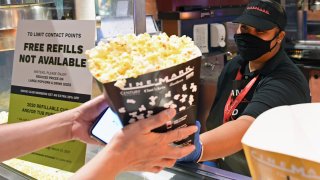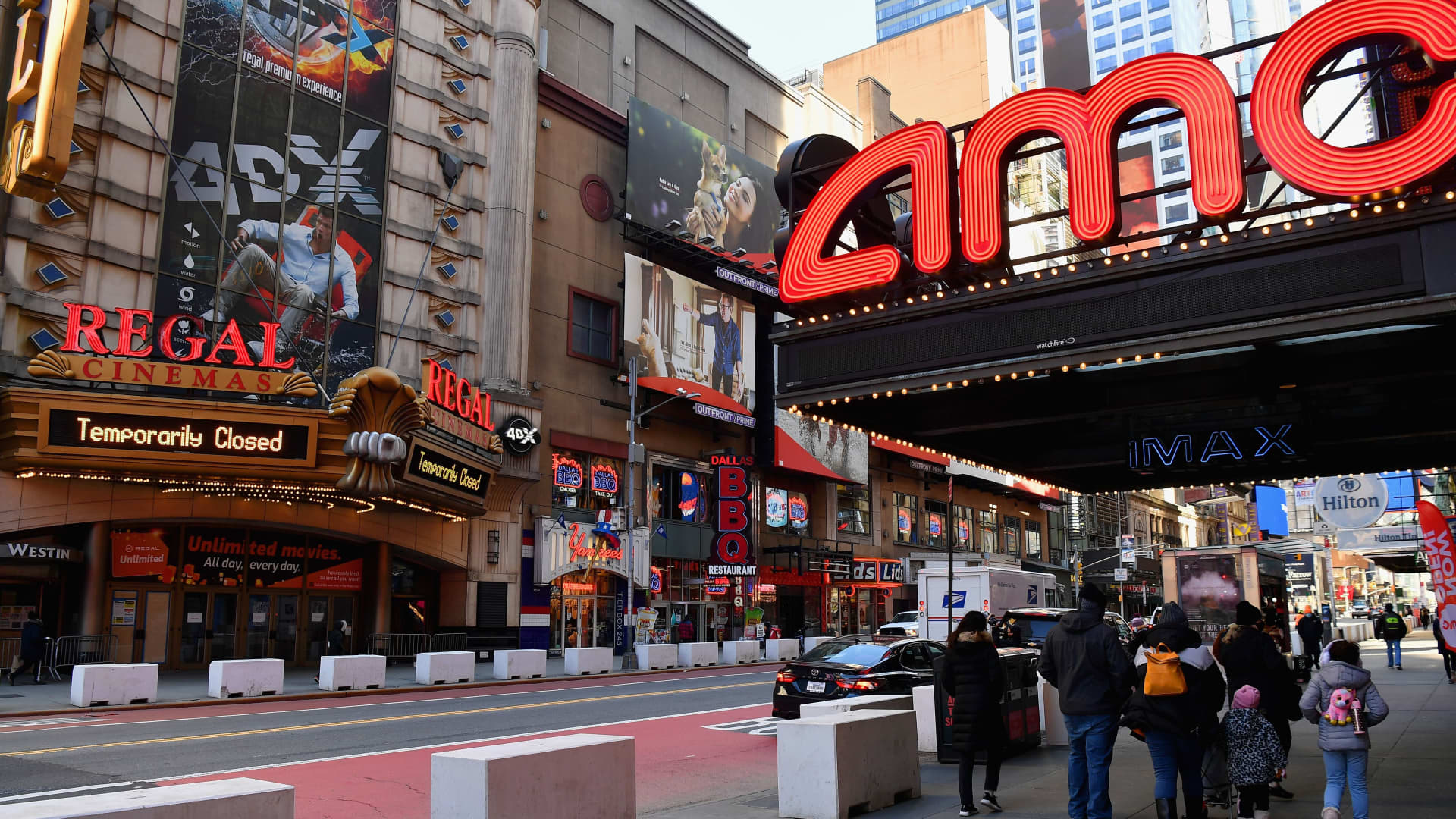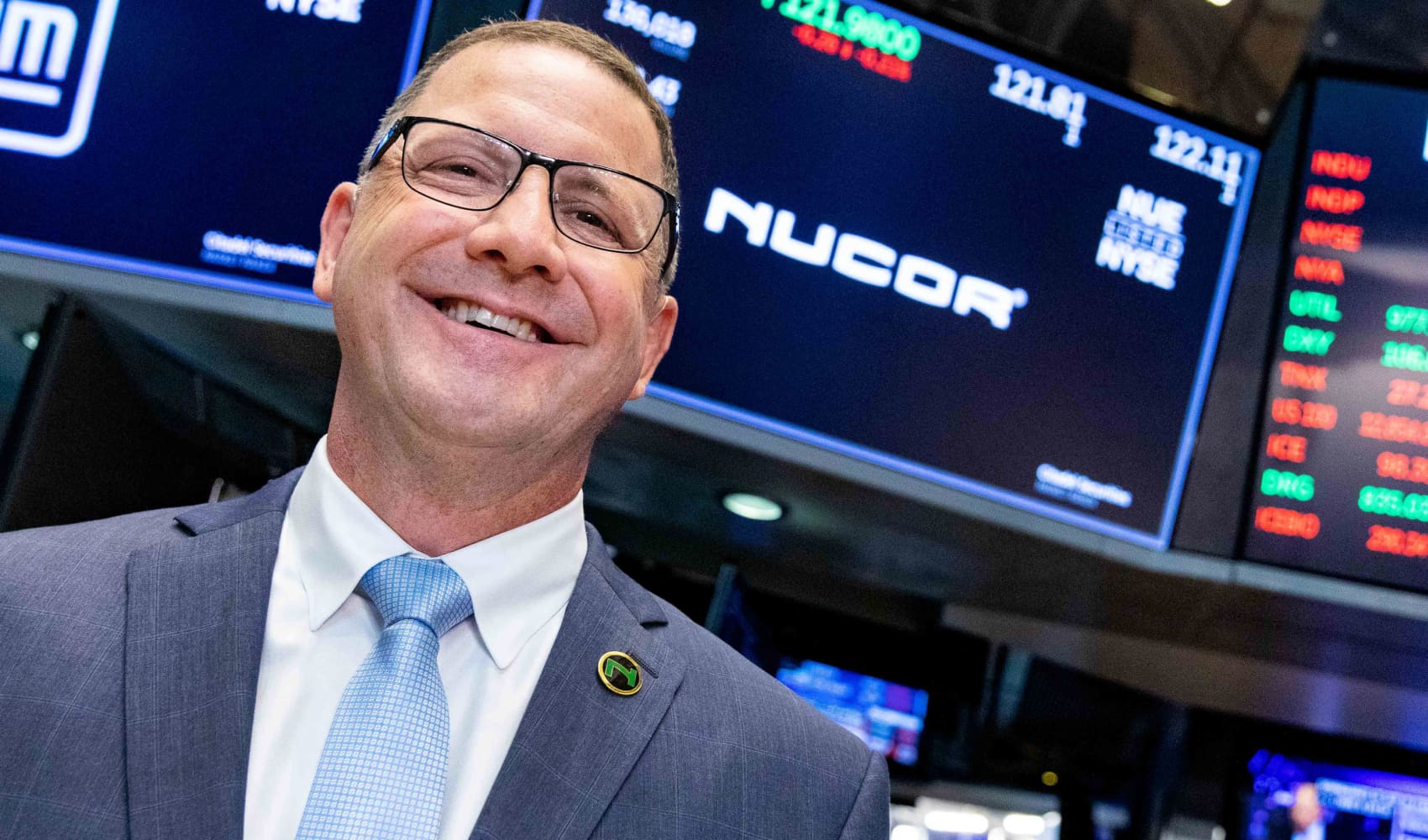
- Even with hits like "Avatar: The Way of Water," movie theaters are struggling with empty seats and heavy debt loads.
- Some theater CEOs remain optimistic that more upscale food and beverage offerings like flatbreads and cocktails will bring in more revenue.
- Theaters generate significantly more profitability from concessions, with some large chains pulling in more than 40% of their revenue from food and beverage.

Movie theaters have struggled to fill seats during the Covid pandemic, but some are facing another problem — what to do with their menus.
At many movie theaters, popcorn and soda appear alongside flatbreads, lobster grilled cheese and elaborate cocktails. But with loads of debt and a shortage of box-office winners, theater chains of all sizes have been forced to change menus and launch creative food initiatives to beef up revenue.
Get DFW local news, weather forecasts and entertainment stories to your inbox. Sign up for NBC DFW newsletters.
"The American consumer now is really demanding more than just a popcorn and a drink or nachos or candy," said Rolando Rodriguez, chairman of the National Association of Theatre Owners and senior advisor at Marcus Theatres. "They're really looking for experiences that they're having for meals associated with watching the films. The expansion ... on the food and beverage is absolutely a must."
Since 2019, before the pandemic, the number of North American screens has fallen by more than 3,000, according to Comscore. Market research firm Mintel said just 54% of people had been to a theater between April and October 2022.
Mike Gallinari, senior travel and leisure analyst at Mintel, said people are more inclined to wait to see a movie, giving streaming services a leg up on theaters. This has forced some theaters to improve their food game.
Money Report
"It is things like concessions and how that fits into a broader movie theater experience that really are things that movie theaters need to focus on and hammer in," Gallinari said. "Not only is that the part of the experience they can control, but that's more of the revenue they can control since movie theater box office [performances] are variable based on the movie."
Not enough films
Theaters struggled to keep their doors open during the pandemic. Cineworld, which operates Regal Cinemas, filed for Chapter 11 bankruptcy protection in September, reporting $8.9 billion in net debt. Regal Cinemas will reject leases for 39 theaters beginning Feb. 15.
AMC Entertainment, the world's largest movie theater chain, exited its third quarter with more than $5.3 billion in debt. AMC's stock has fallen around 50% over the past 12 months. On Monday, the company announced it will change ticket pricing depending on seat location.
AMC, which operates dozens of AMC Dine-In Theaters, is unlikely to turn free cash flow positive until 2024, said Eric Wold, an analyst at B. Riley Securities.
Lack of content is the biggest problem for theaters, he added. Compared with 2019, there were 50% fewer films released in theaters last year, Wold said. Box-office sales were down more than 30%. He predicted the industry will not return to pre-pandemic film release numbers until 2025 due to delays and production backlogs.
To be sure, though, studios have been more specific about what films get shown in theaters, favoring blockbuster-style releases. "Avatar: The Way of Water," which came out in December, and "Spider-Man: No Way Home," released in late 2021, are among the 10 all-time highest-grossing films.

"A restaurant can open if it can get its hands on food and chefs. A theme park can open if it has electricity and people to run the rides. But if there are no films coming out, a movie theater can't open and show whatever they want," Wold said.
While contending with lower attendance, Marcus Theatres reduced menus at its Zaffiro's, Reel Sizzle and Take Five Lounge concepts, as well as its Movie Tavern locations. Now, menus are mostly back to what they were pre-pandemic as consumer spend grew.
"There's a kitchen in everybody's house, but people still go out to eat," Marcus CEO Greg Marcus said.
"At the end of the day, humans want to be amongst each other," he said. "They want to get out. They don't want to stay home and they don't want to sit on their couch."
The economics of concessions
Revenue from ticket sales is about a third larger than concessions sales, according to Wold. But theaters generate significantly more profitability from concessions than from ticket sales.
About half the money from ticket sales goes to studios, while theaters keep all concessions margins, which typically amount to more than 80%, Wold said. Marcus Theatres pulls in 44% of its total revenue from concessions, compared with 39% at Cinemark Theatres and 36% at AMC.
"No matter how great of a flatbread or how amazing of a cocktail a theater can make, if the movie is crummy, no one is going to come to the theater," Wold said. "If you can create better food while someone is already there and give them an added reason to why they want to go to a theater to see a film ... that definitely is a draw and can be an added revenue source."
According to data from research firm EntTelligence, the average medium popcorn at domestic movie theaters is $8.14, while a medium drink runs for $6.20. Wold said these items typically have mid-90% margins.
For more upscale items, margins are significantly smaller, meaning theaters cannot do away with the classics, but instead seek incremental revenue from sandwiches or entrees.
"Throughout the pandemic, you've seen the average concessions per patron go up dramatically," Wold said. "That's a combination of getting more out of each patron through increasing the basket size of what they order at the counter, but also getting more people to the counter who otherwise would've skipped it."
Prior to fourth-quarter earnings, Wold said theaters have not seen pressure on consumer concessions spending despite rate hikes. Concessions have been a "pretty recession-resilient segment," he said.
Theaters with larger menus, however, face issues similar to those of restaurants, according to Mintel's Gallinari, with some raising prices in response to increasing egg and meat prices. Some are adopting healthier food and bakery items, as well as partnering with local businesses.
"With movie theaters and concessions already having a reputation for being overpriced, being subject to the wills of the market in that way can really work against the movie theater's favor," Gallinari said.
Wold said theaters have used the pandemic to make concession sales more streamlined amid labor shortages. Pre-pandemic, some theaters adopted a dine-in model in which servers would bring food from a central kitchen to auditoriums, though many have shifted toward pick-up apps and reserved seating.
Marcus Theatres recently debuted an online ordering app that more efficiently handles large quantities of orders. He said the app has been more effective for upselling consumers and reducing lines.
"If you take a minute or two, minute and a half off the [ordering] process and multiply that times 15 million transactions, that is a meaningful number if you can figure out how to structure yourself from a labor perspective to move from order taking to just order fulfillment," Marcus said.
Hungry for long-term success
With some menus exceeding 50 items, theaters have been more methodical about staffing and food preparation for slower and heavier nights, Wold said.
Some theaters, such as Dallas-based Studio Movie Grill, predict attendance weeks in advance.
"We've got enough history with enough analysis to say we know, whether it's a horror movie or a romantic comedy, how they are going to perform based on national predictions and based on our particular locations," said CEO Ted Croft.
Studio Movie Grill, which takes orders at customers' seats, recently shortened menus to focus on burgers, pizzas and alcoholic beverages, which the team can execute quickly to accommodate at times more than 1,000 seats. About 25% of the overall field team is back-of-house kitchen staff, Croft said.
After bringing operating hours back to pre-pandemic levels — and introducing themed drinks for films like "Black Panther: Wakanda Forever" — Croft said per-person concessions averages continue increasing.
"The fact that we are outperforming pre-pandemic key performance indicators gives us a lot more confidence that if we just get more movies, we're going to continue to grow," Croft said.

Rich Daughtridge, president and CEO of Maryland-based Warehouse Cinemas, noticed a similar trend. He said about two-thirds of staff at the theater's locations are in the kitchen or behind the concessions, preparing gourmet grilled cheeses, hot dogs with homemade beer cheese, and classics like nachos and a seasonal popcorn mix.
Daughtridge said the menu stays away from more perishable and lower-margin items such as steak or seafood.
There is a selection of craft cocktails and 32 craft beers and ciders on tap at its self-serve beer wall. This month, the theater will offer a themed cocktail for the movie "Winnie the Pooh: Blood and Honey."
"Hollywood creates great stories, and it's our job to make sure our products, the sound, the picture, the seat, all those things together are something that they desire as a big-screen event," said Daughtridge, who is also president of the Independent Cinema Alliance.
Cinépolis, a Mexican theater chain with 25 U.S. locations, updates its menu twice yearly and serves lobster tacos and truffle mushroom pizza, among other nontraditional theater munchies.
For an advanced screening of the bloody culinary satire "The Menu," Cinépolis launched its "Movie and a Meal" initiative to curate seasonal specials with the film. The company will be doing another iteration for "Cocaine Bear," featuring two drinks, two appetizers, a main course and a dessert.
"As our founder used to say back in Mexico, we build theaters to sell food," said CEO Luis Olloqui.
– CNBC's Sarah Whitten contributed reporting.
Disclosure: "Cocaine Bear" is being distributed by Universal Pictures, which is part of CNBC's parent company, NBCUniversal.
Clarification: This story has been updated to clarify that AMC Entertainment exited its third quarter with more than $5.3 billion in debt.






